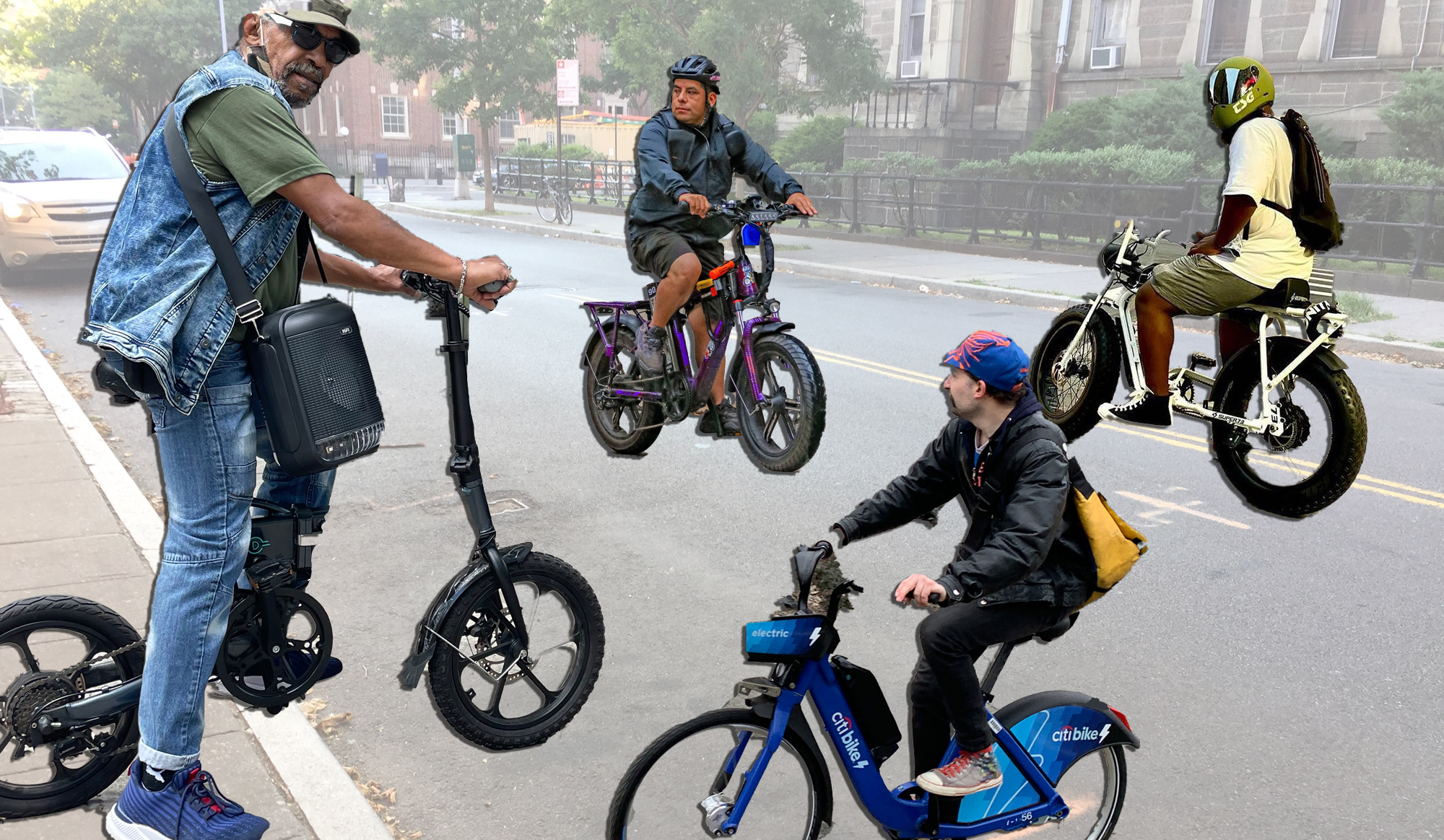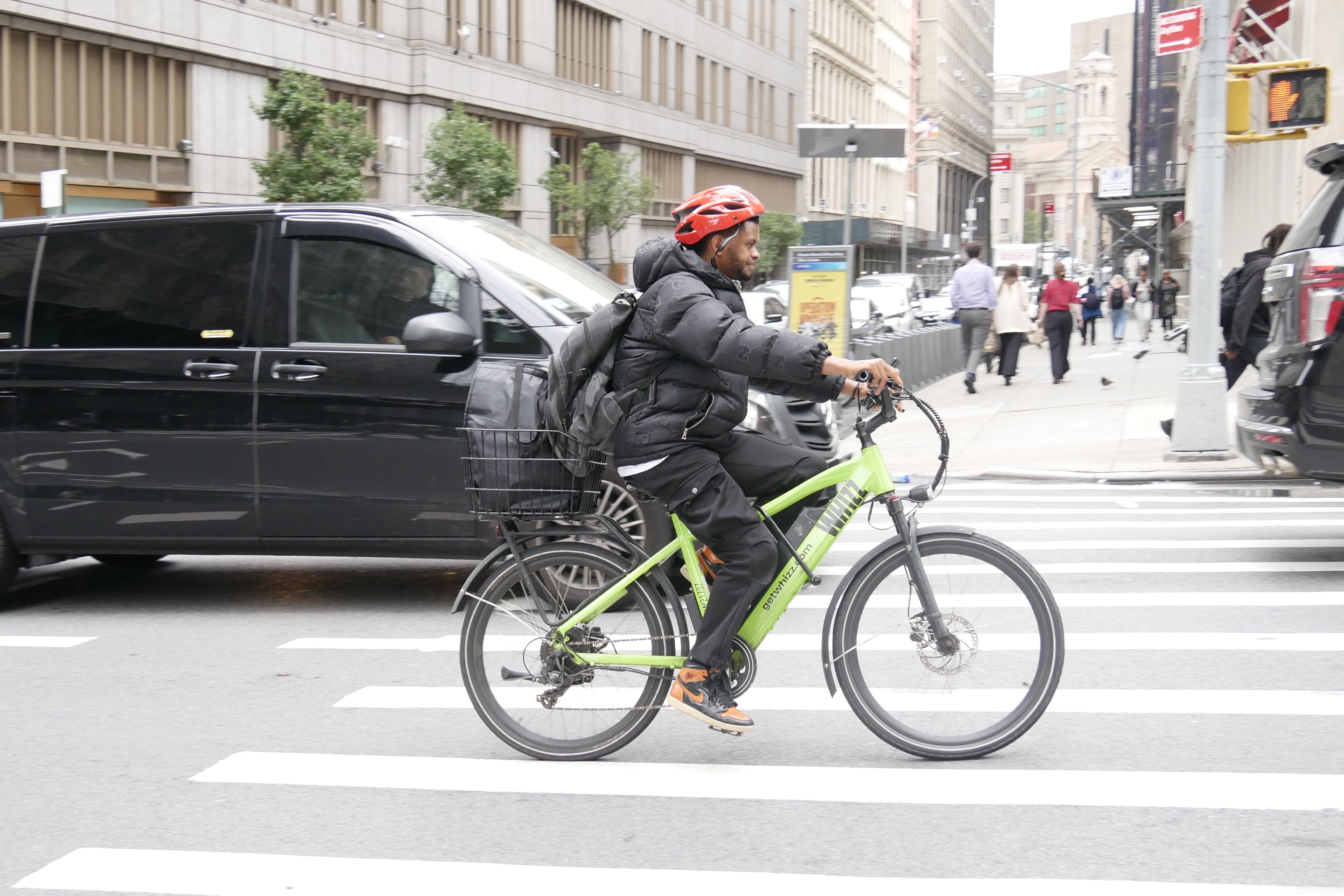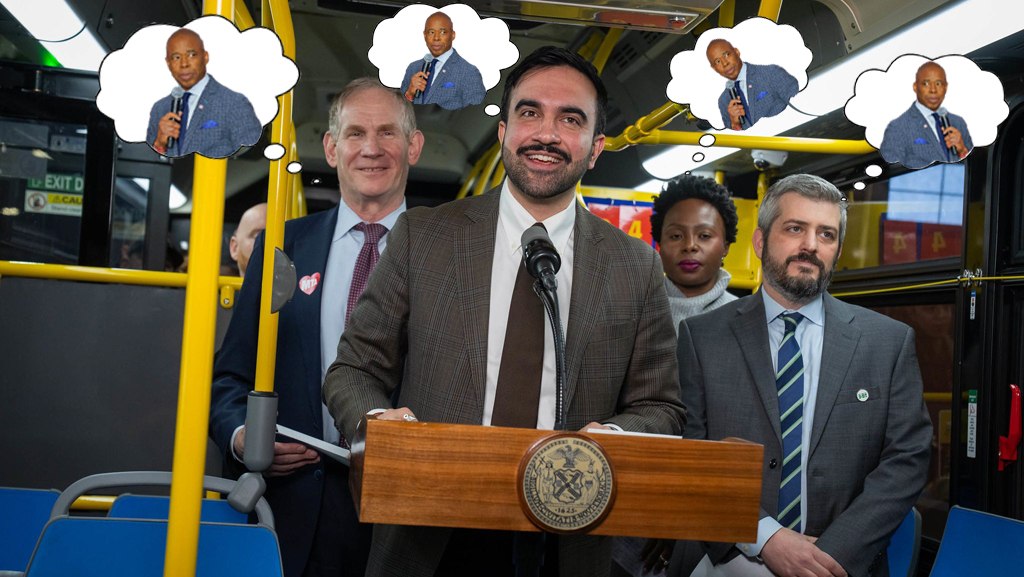On Wednesday, the City Council will hold a hearing on a bill that would require the city Department of Transportation to create a registration system, and a newly created license plate, for all electric bikes, even pedal-assist Citi Bikes. Disconnected from the lessons of the past and divorced from practical and philosophical realities, the bill’s supporters and its sponsor Robert Holden will argue that licensing is a common sense way to address the concerns that many New Yorkers have about the behavior of some e-bike riders on the roads and, regrettably, on the sidewalks.
But nothing could be further from the truth.
I’ve spent most of my career managing public space at the city’s third-largest Business Improvement District and championing the creation of a regional secure bike parking and charging network with my company, Oonee. As such, I can promise that if this bill becomes law, not only will it fail to achieve its own stated goals, it will stand alone as one of the most regressive urban transportation policies of the 21st century.
How we got here

Before going any further, we must acknowledge the truth: too many e-bike riders are riding on sidewalks, running red-lights and breaking other rules in ways that make some members of the public feel unsafe.
These behaviors are, in fact, not remotely as unsafe as those exhibited by speeding or reckless drivers, but they do represent a quality-of-life concern for New Yorkers who have become inured to the dangers of cars and see bikes as the new thing on the streetscape.
Street safety activists are often attacked for ignoring this. But we don’t ignore it at all; in fact, we have been ardently advocating for decades for known, tested and proven safety designs: protected bike lanes, road diets, automated enforcement cameras, education, pedestrianized (e-bike free) streets.
All of these safety measures have been opposed at various times by Holden (D-Queens) and many of his colleagues.
Beyond that is another fact: New York’s existing traffic laws famously extend to cyclists, and are the responsibility of the NYPD cops to enforce. Which they do.
The main problem? They don’t do it consistently. The city’s 30,000-plus-member police force is fully capable of writing tickets to e-bicyclists who run red lights or ride on the sidewalk, just as they can for car drivers. But the NYPD wrote only 48,112 tickets to drivers and cyclists for running red lights last year — which works out to fewer than two tickets per precinct per day.
That’s hardly going to stop the problem.
In addition, safer streets start with lower speeds. In addition to cracking down on reckless drivers — which the state Department of Motor Vehicles does not do with any consistency — the state could reclassify the fastest e-bikes, which are currently known as Class 3 and can throttle, like a motorcycle, up to 25 miles per hour, as a motorcycle that must be registered. But that would result from state legislation, not Holden’s proposed city-level regime.
Holden’s bill, officially Intro 606, is seductive in its simplicity: It would require all powered bikes, scooters, skateboards, OneWheels and even motorized wheelchairs to be registered under a new bureaucracy inside the Department of Transportation — and to prominently display a registration plate (similar to a license plate).
The purported reasoning is that if bikes and other small conveyances had license plates, it would be easier for law enforcement to track down offenders or for citizens to report them. Behind this veil, however, is a monster of a mandate that will be expensive, difficult to enforce, prejudicial and practically useless.
Expensive to buy-in
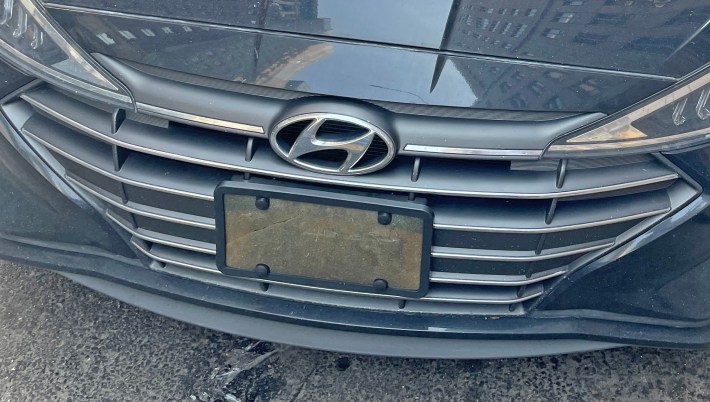
For the bill to even hope to achieve its goal of accountability, nearly all e-bike riders would need to register and prominently affix the plates onto their bikes. After all, if few people even display the plates, how will anyone identify the vehicle in question for enforcement purposes?
This is far more complicated than it seems. First, the DOT would have to create a sub-department to register and issue the plates. This would entail building out a secure enterprise-level database and registration system and hiring a contractor for issuing the plates themselves. Both of these projects would almost certainly require lengthy procurement processes and would cost millions to set up. There are hundreds of thousands of e-bikes, e-scooters and other motorized devices within the five boroughs; creating a secure registration system and the ability to correctly issue the plates won’t be cheap or fast.
And that’s not all. Would cyclists register their e-bikes at the point of purchase? If so, that would require lengthy discussions with equipment manufacturers, bike shops and re-sellers. And if cyclists are on the hook for doing it themselves, how will they be notified? (Will the city be forced to spend millions on public service ads, which never work anyway?)
Will cyclists have to register in person (at some sort of mini-DMV) or would there be an online portal? Both of these options, of course, would be quite expensive for taxpayers.
And there are more questions: What will be the grace period for the hundreds of thousands of bikes, and scooters that already live in the homes of New Yorkers? Will the system be able to process many thousands of registrations per day? Will parents be responsible for registering their kids’ bikes?
How would the mandate apply to the hundreds of thousands of people that move to the city each year with little knowledge of New York’s program? Moreover, what about commuters who bring their bikes, scooters and other e-micro-mobility devices from New Jersey, Long Island and other jurisdictions each day? Will they have to display the plates as well? Or swap out plates from other jurisdictions that will jump on the registration bandwagon once New York City acts?
It’s reasonable to assume that the bill’s supporters have thought through all these critical questions, but they have not. In fact the only implementation mandate in the bill’s 416 words are these: “This local law takes effect 120 days after it becomes law.”
Impossible to fairly enforce
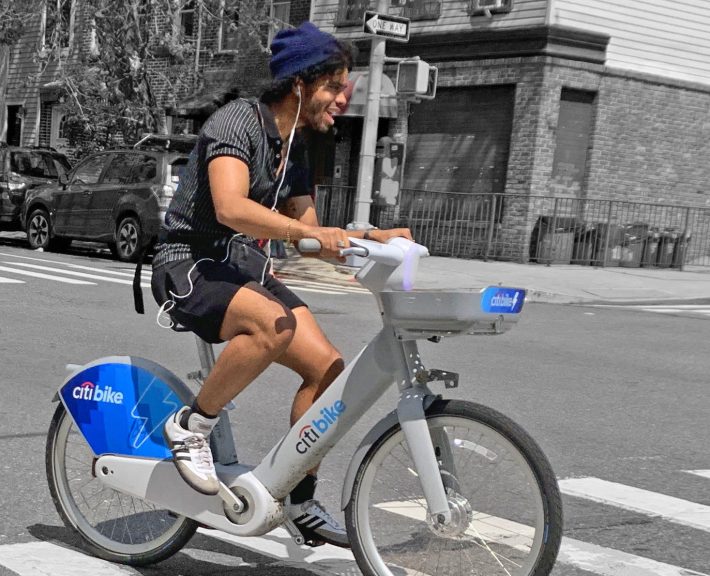
Teenagers in Perth Amboy could tell you how they learned about their town’s infamous registration scheme.
Recall what happened in that Jersey town in 2021: In April, a group of teens were stopped by cops for riding unregistered bikes. One was even detained in handcuffs at police headquarters and the others had their bikes seized. A video of the incident went viral and critics charged the police with unnecessarily harassing minority teens who were doing little else but being, well, teens.
They learned the hard way. But so did Perth Amboy; the city scrapped its bike registration plan soon after.
But absent an unprecedented and costly public education campaign, the same fate likely awaits many thousands of New Yorkers, especially those who hail from poorer minority neighborhoods, if this bill passes.
In addition, this bill threatens to bring back the specter of selective policing and the era of stop-and-frisk.
Registration mandates are notoriously difficult to enforce at almost every level of government. The federal government intended Real IDs to be the FAA standard in 2008, but the program suffered from low compliance, even with the full muscle of state DMVs and the specter of not being able to fly. Today, only 56 percent of Americans have converted, 19 years after the original goal of 100 percent.
To avoid this fate, the NYPD would have to mount a massive, long-term, enforcement blitz to crack down on those who do not get their registrations in time.
It will be expensive, laborious and ugly.
Police will have to be thoroughly trained on how to spot unregistered bikes and scooters. New Yorkers will pay millions of dollars in fines — not for unsafe biking such as riding the wrong way down a sidewalk, but for simply not displaying their plates on their e-bikes and e-scooters.
Police vans will have to be dispatched to confiscate many thousands of e-bikes and scooters, many of which will go unclaimed as the owners will simply lack the funds to pay for their return. That includes people whose livelihood depends on having the bike.
So in a cruel ironic twist, Holden may hamstring officers from enforcing existing traffic laws, thereby exacerbating the very safety issue against which he is crusading.
Of course, many will simply turn to counterfeiting — and cops will be hard-pressed to tell what's real and what's fake: “I swear, officer, this is a legal Yonkers plate!”
With all of this time, energy and money dedicated to simply getting cyclists to comply with registration, will the NYPD actually have time left over to stop the actual traffic violators?
The net result, of course, will be a chilling effect on the public: New Yorkers simply won’t ride e-bikes or e-scooters. The greenest, most accessible transportation mode will be outlawed by default in Gotham.
Useless and impractical
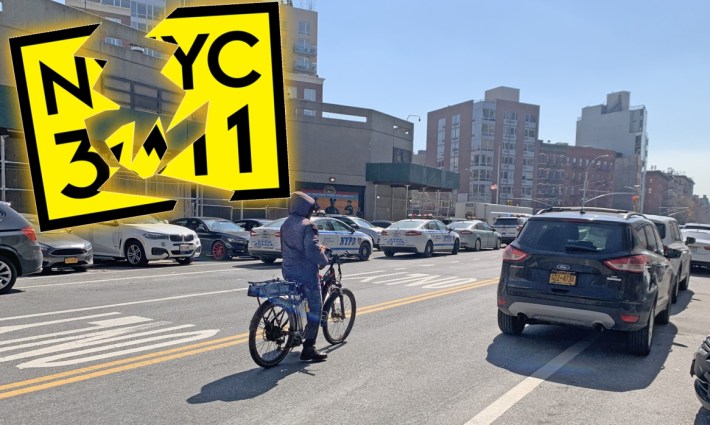
Supporters of the bill say that a registration system will give officers a tool to bring order back to the sidewalks because if the e-bikes are registered, police can track offenders and there can be accountability.
Such a system already exists. It’s called ID.
Almost every resident of the city has a government-issued identification card, which have become the standard means of identification in America today. They’re used at neighborhood liquor stores and international airports. They’re easy to replace and are now even on a mobile app.
New Yorkers that have had the misfortune to have been stopped by police know the first question is almost always, “Let me see some ID.”
As a result, police have no problem holding reckless cyclists accountable — indeed, thousands of cyclists already receive tickets from cops for running red lights or not having bells. Holden’s bill would not change this, but would indeed reduce the NYPD’s ability to focus solely on the few bad apples who are making our roads unsafe.
The only remotely plausible use for this system is that citizens can quickly whip out their phones and record the e-bikers or e-skateboarders as they violate the rules, and then forward these videos to their local precinct for investigation.
That’s laughable. As anyone who has tried to do this with a full-sized car can tell you — and as Streetsblog has exhaustively documented — the police simply do not respond to complaints about bad driving from the public.
Holden should also take note that history is replete with cities that have run away from cycling registration schemes, often at the request of their own police departments.
Los Angeles repealed its failed bike registration program in 2009 after the LAPD described registration enforcement as “not prudent” compared to enforcement of real moving violations. Toronto spent more than a year studying a registration program and roundly rejected the scheme. Detroit and Washington repealed their programs in 2008 for similar reasons.
Holden wants New Yorkers to spend the next five years learning what everyone else has figured out decades ago.
City Council hearing on Intro 606, Wednesday, Dec. 11, 10 a.m. at City Hall. For more info, click here. You can also submit testimony by emailing it to testimony@council.nyc.gov. The deadline is 72 hours after the close of the hearing.
